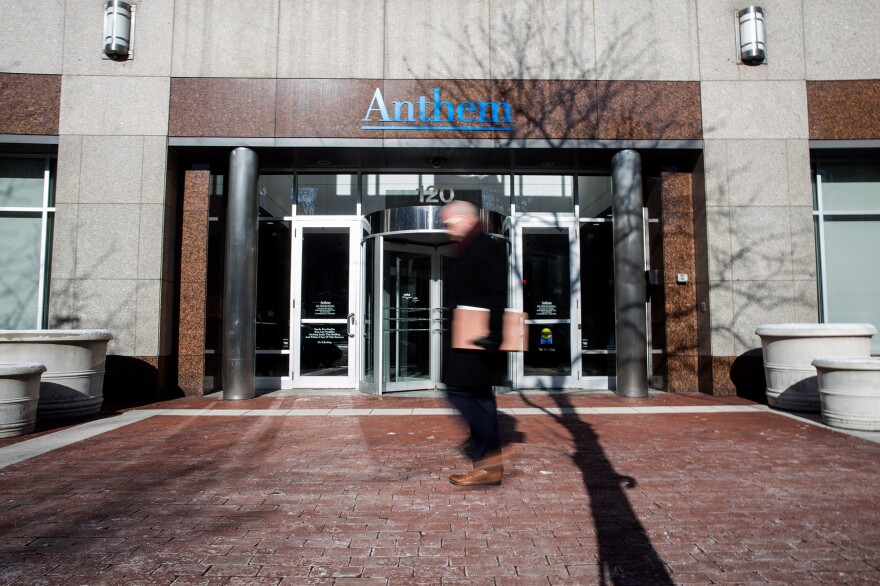Anthem Blue Cross is working to clear a backlog of claims resulting in delayed payments for some medical providers in the state that an industry group says has grown into hundreds of millions of dollars.
The delayed payments, which have drawn the attention of the New Hampshire Insurance Department, appear part of a nationwide trend of unpaid claims by Anthem, the country’s second-largest insurance company.
After Anthem allegedly began falling behind on payments, the New Hampshire Hospital Association surveyed 22 hospitals twice, in May and September. According to the survey, the hospitals report that Anthem, the state’s largest health insurer, has failed to process $300 million in claims submissions, with $181 million of that outstanding debt more than 30 days old.
Those figures, however, represent billed charges and don’t reflect the actual expected repayments previously negotiated between Anthem and the medical providers. Those figures are likely 20 to 50 percent less.

The New Hampshire Insurance Department is aware of the back payments and said it is monitoring the status of Anthem’s outstanding bills, though regulators noted they believe the company is still processing payments at a rate that is on par with other insurers in the state.
“We understand there are issues with Anthem’s accounts receivable – we are concerned about it, and have been proactively working with Anthem and impacted providers to address this issue,” a department spokesperson said.
In a statement, Anthem said the delays were caused by updates in its claims processing system and due to difficulties posed by the pandemic.
“We recognize there have been some challenges as we work with care providers to update claims processing,” Stephanie DuBois, Anthem Blue Cross’s director of public relations said in a statement. “We are dedicated to those we serve and partner with, and are focused on solving these challenges.”

The survey results were obtained by NHPR, and have not previously been released publicly.
Along with the rise in outstanding bills, hospitals say they’re also frustrated with “roadblocks” faced by their staff in working to resolve denials of coverage for medical services.
According to the survey, 20 out of 22 hospitals in New Hampshire reported Anthem had incorrectly denied claims, while other hospitals complained about long wait times to resolve disputes.
“The amount of administrative time staff have to expend to conduct business with Anthem is unreasonable,” one survey respondent wrote. “There is a complete lack of accountability on Anthem's part.”
After approaching Anthem with their concerns, in July the insurer and hospital representatives began meetings to resolve the repayment delays, though the accounts payable balances have continued to grow since then, according to the survey.
Anthem, however, said it is currently processing claims at its “targeted level” and disputes allegations made by the hospitals that it is slow to repay its providers. The insurer said 95 percent of claims in the state are processed within 14 days, with over 98 percent paid within 30 days.
“Due to challenges, these percentages dipped slightly earlier in the year, by 1 to 1.5 percent, but we are back at targeted rates for processing levels,” DuBois said.
While Anthem maintains that the delays were due to technical issues and challenges posed by the pandemic, the hospitals say the problems go beyond that.
“As one of the largest insurance companies in the country, they need to be able to process claims in a timely manner,” Steve Ahnen, president of the New Hampshire Hospital Association, told NHPR.
“That’s the core of what they do, but the results we’re seeing here are indicative of a set of systems that are just not working.”Steve Ahnen
Some smaller health care providers have also faced months of delays in receiving payments, according to interviews with NHPR, with limited information coming from Anthem on when the situation may be resolved.
Anthem declined to say how many medical providers have been affected in New Hampshire.
State regulators at the New Hampshire Insurance Department have been monitoring the delayed payments since the spring when they were first notified of the issues.
The agency “continues to receive regular updates to ensure all claims are paid in an appropriate and timely manner,” the Insurance Department said. “We understand that additional work needs to be done to remedy the issue and we will continue to hold Anthem accountable to fixing the problems.”
Regulators added that “Anthem has historically been one of the fastest to pay,” and that even with its current delays, its repayment rate remains on average with other insurers in New Hampshire.
According to the survey of hospitals, more than $64 million in billed charges submitted to Anthem were still not processed after more than 180 days. Between May and September, when the association completed its two surveys of members, the total amount of outstanding billed charges grew from $263 million to $300 million.
The repayment delays don’t appear to be linked to the company’s overall financial health.
Anthem’s parent company, Indianapolis-based Anthem, Inc., has seen its share price nearly double to $370 per share after plummeting below $200 during the earliest days of the economic shutdown in March 2020.
Hospitals in New Hampshire, meanwhile, saw many of their revenue streams dry up in the early days of the pandemic when the cancellation of so-called elective procedures led numerous facilities to caution of dire consequences. Both the state and federal governments awarded COVID relief funds to hospitals.
In the survey results, the association wrote that the repayment issues come as its member facilities continue to struggle with staffing shortages and other issues brought on by the pandemic.
“The issues outlined above not only impact hospitals but patients – Anthem members – as well. Hospitals are spending an inordinate amount of time and effort to get payment for services rendered,” the NHHA wrote in the survey results.








